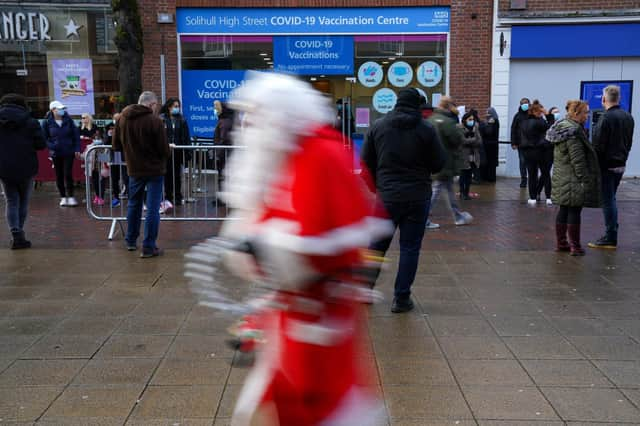More coronavirus restrictions could be needed to slow Omicron spread, scientist suggests


Labour leader Sir Keir Starmer has confirmed that the party will vote with the Government on the Plan B restrictions, likely avoiding an embarrassing defeat for the Government, but concern is growing that more measures may need to be introduced at a later point,
Dr Susan Hopkins, the chief medical adviser for the UK Health Security Agency, said that the Government has “very difficult” decisions ahead when it comes to keeping the virus at bay.
Advertisement
Hide AdAdvertisement
Hide AdShe told the BBC’s The Andrew Marr Show yesterday: “I think that the restrictions that the Government have announced are sensible. I think that we may need to go beyond them. But we’ll need to watch carefully what happens with hospitalisations.”
She added: “The challenge we have and the challenge Government has is trying to balance the risks and benefits to the society, to people, to the population, to the economy, and to health, and they have very difficult decisions ahead of them.”
With less than a fortnight to go until Christmas, Dr Hopkins also said that a new wave of Omicron infections is “inevitable” and urged the public to keep their social contacts to a minimum now if they want to keep their family safe over the festive period.
Having less contact with other people, taking lateral flow tests before meeting anyone, working from home, wearing a face covering, keeping areas well ventilated, getting vaccinated and having the booster jab are all measures people can take, she said.
Advertisement
Hide AdAdvertisement
Hide AdWhen asked directly if people should reduce their contacts, she told Times Radio “We’ve spent two years, almost two years now living with this virus. We know how it transmits. It transmits when we’re with other people.
“And therefore when we are coming up to a time where we will have engagements that we want to make, family that we want to see, then ensuring that we have less contacts before those is important so that we don’t transmit to others.”
A raft of Plan B guidance comes into force today to try and stem the rapidly spreading Omicron variant, with more people expected to work from home, and a Covid pass needed to access certain busy venues such as nightclubs.
People who are not vaccinated will be able to use a negative lateral flow test to approve their entry, but the pass system has sparked outrage from a large section of the Conservative Party.
Advertisement
Hide AdAdvertisement
Hide AdThe Prime Minister could potentially be facing the largest rebellion of his premiership tomorrow, with more than 60 Tory MPs said to be against the imposition of further restrictive measures.
Sir Keir confirmed Labour would vote for the new measures, but said that he was “not supporting the Prime Minister, I’m supporting our NHS, and I’m supporting the public in relation to this pandemic.”
He told the BBC yesterday: “If you look at the science in relation to Omicron, the new variant, there is a real concern that we could be in a situation where the number of cases is doubling in a shorter period of two days.
“Now, I understand people say that that hasn’t led to higher hospitalisations and deaths yet, but the sheer volume of cases is very, very worrying.”
Advertisement
Hide AdAdvertisement
Hide AdSir Keir also insisted that, while he is not “comfortable” with the idea of vaccine passports, he believes they are necessary to keep the public safe and slow the spread of the virus.
“Particularly if it’s linked to the alternative of a negative test, which is what a lot of venues have been operating on a voluntary basis now for a very long time,” he added.
